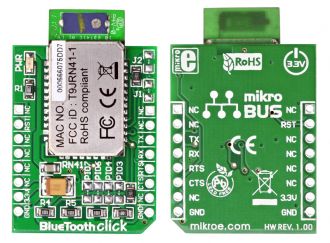
We strongly encourage users to use Package manager for sharing their code on Libstock website, because it boosts your efficiency and leaves the end user with no room for error. [more info]

Rating:
Author: MIKROE
Last Updated: 2019-08-02
Package Version: 1.0.0.1
mikroSDK Library: 1.0.0.0
Category: BT/BLE
Downloaded: 14761 times
Followed by: 2 users
License: MIT license
Example for Bluetooth click board in mikroBUS form factor. This expects a message from the Master (Bluetooth dongle, mobile phone, etc) and displays in on the Lcd.
Do you want to subscribe in order to receive notifications regarding "Bluetooth click" changes.
Do you want to unsubscribe in order to stop receiving notifications regarding "Bluetooth click" changes.
Do you want to report abuse regarding "Bluetooth click".

Front and back view of Bluetooth click board designed in mikroBUS form factor. mikroBUS is specially designed pinout standard with SPI, I2C, Analog, UART, Interrupt, PWM, Reset and Power supply pins.
View full imageLibrary Description
The library covers all the necessary functions to control Bluetooth Click board.
A library performs the communication with the device via UART interface with the RN-41 Bluetooth module.
Key functions:
void bluetooth_writeByte(uint8_t input) - Write Single Byte.void bluetooth_uartWrite( uint8_t *txData ) - UART write function.BLUETOOTH_STATUS_T bluetooth_setDeviceName( uint8_t *name ) - Set the device name function.Examples description
The application is composed of the three sections :
void applicationTask()
{
cnt = 0;
memset( txtBuffer, 0, 16 );
EnableInterrupts();
while ( !dataReady );
Disableinterrupts();
dataReady = 0;
cnt = 0;
}
Additional Functions :
Other mikroE Libraries used in the example:
UARTConversionsAdditional notes and informations
Depending on the development board you are using, you may need USB UART click, USB UART 2 click or RS232 click to connect to your PC, for development systems with no UART to USB interface available on the board. The terminal available in all MikroElektronika compilers, or any other terminal application of your choice, can be used to read the message.